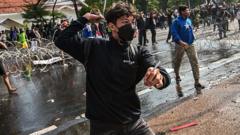What Sparked the Clash Between Protesters and Police After a Taxi Driver's Death in Indonesia?

Published: 2025-08-29 14:42:12 | Category: technology
Mass protests erupted across Indonesia after the tragic death of a ride-sharing driver, Affan Kurniawan, who was struck by a police vehicle during a demonstration against various socio-economic issues. The incident has highlighted widespread frustrations over the rising cost of living, low wages, and job scarcity, posing a significant challenge for President Prabowo Subianto's administration.
Last updated: 10 October 2023 (BST)
Key Takeaways
- The death of Affan Kurniawan has sparked nationwide protests in Indonesia.
- Protesters are demanding justice, higher wages, and lower taxes.
- Clashes between police and demonstrators have escalated in major cities.
- President Prabowo Subianto has issued an apology and pledged support to Kurniawan's family.
- The unrest is a critical test for the current government amid rising public discontent.
The Context of the Protests
The protests that have unfolded in cities like Jakarta and Surabaya were ignited by the death of Kurniawan, a 21-year-old ride-sharing driver. This incident occurred against the backdrop of long-standing grievances among Indonesians regarding rising living costs, job scarcity, and perceived government indifference to the plight of ordinary citizens. The unrest reflects deeper frustrations that have been simmering for years, particularly in a nation where inequality and corruption remain pervasive issues.
Affan Kurniawan's Tragic Death
Affan Kurniawan was involved in a protest addressing housing perks for politicians and the overall cost of living crisis. His death on Thursday night at the hands of a police vehicle has been met with outrage, leading to calls for justice and accountability. The police have faced scrutiny for their handling of the situation, and various officials have expressed their condolences while also calling for calm among the protesters.
The Nature of the Protests
Following Kurniawan's funeral on Friday, where thousands attended to pay their respects, protests intensified. Demonstrators clashed with police, with some throwing Molotov cocktails and fireworks in response to the authorities' use of tear gas and water cannons. The unrest has spread beyond the capital, with protests reported in several regions, including Jawa Barat, Surakarta, Bandung, and Medan.
Demands of the Protesters
The protesters have articulated a range of demands, primarily focused on:
- Justice for Affan Kurniawan.
- Higher wages for workers.
- Lower taxes.
- Stronger anti-corruption measures.
- Reassessment of new allowances for lawmakers.
One of the contentious issues is the recently proposed monthly allowance for lawmakers, set at 50 million rupiah (£2,250), which is almost ten times the minimum wage in Jakarta. This disparity has incited anger among citizens struggling to meet basic needs.
Government Response
President Prabowo Subianto has publicly expressed his shock and disappointment over the incident, offering an apology to Kurniawan's family. He has also pledged to ensure a thorough investigation into the conduct of the police involved. The Jakarta governor, Pramono Anung, visited the family to offer condolences and financial assistance for funeral arrangements, reflecting the government's attempt to address public anger.
Public Sentiment and Political Implications
The protests are not only a response to Kurniawan's death but also a manifestation of broader public dissatisfaction with the government. The economic challenges faced by many Indonesians, coupled with a perceived lack of accountability among political leaders, have contributed to an atmosphere ripe for unrest. This situation serves as a critical test for President Subianto's administration, which must navigate both the immediate crisis and the underlying issues of governance and social justice.
What Happens Next?
As the protests continue, the government's ability to respond effectively will be crucial in determining the future political landscape in Indonesia. Officials have called for restraint from demonstrators, urging them to seek dialogue rather than confrontation. However, given the scale of public discontent, it remains to be seen whether this will lead to meaningful change or further unrest.
Support from the Ride-Sharing Community
The ride-sharing company Gojek has also expressed its condolences and support for Kurniawan's family, acknowledging the loss felt within its community. The company's statement highlighted the personal connections and struggles behind every driver, emphasising the human aspect of the protests.
Conclusion
The protests in Indonesia are a powerful reminder of the challenges facing many citizens in the wake of economic hardship and social injustice. As public sentiment continues to grow, the government must address these issues seriously to restore faith and stability within Indonesian society. This moment not only calls for justice for Affan Kurniawan but also for a reevaluation of policies impacting the lives of everyday citizens.
FAQs
What sparked the protests in Indonesia?
The protests were sparked by the death of ride-sharing driver Affan Kurniawan, who was hit by a police vehicle during a demonstration against socio-economic issues.
What are the main demands of the protesters?
Protesters are demanding justice for Kurniawan, higher wages, lower taxes, stronger anti-corruption measures, and a reassessment of new allowances for lawmakers.
How has the government responded to the protests?
The government, including President Prabowo Subianto, has expressed condolences and promised to investigate the incident. Officials have urged protesters to maintain calm and seek dialogue.
What is the significance of Kurniawan's death?
Kurniawan's death has become a symbol of broader frustrations regarding economic inequality, government accountability, and the struggles faced by everyday Indonesians.
In which cities are protests taking place?
Protests have been reported in major cities such as Jakarta and Surabaya, as well as other regions including Jawa Barat, Surakarta, Bandung, and Medan.



